The Best Things to Do in Aqaba, Jordan: A City of Contrasts
Aqaba, Jordan, is a city of contrasts. From its stunning coral reefs to its rich historical sites, this coastal city offers travellers a diverse range of experiences. Whether you're an adventure seeker, a history buff, or simply looking to relax on the beautiful beaches, Aqaba has something for everyone.
In this blog post, we will explore the best things to do in Aqaba and show you why it should be on your travel bucket list. So grab your snorkel gear, lace up your hiking boots, and get ready to discover the wonders of Aqaba, Jordan.
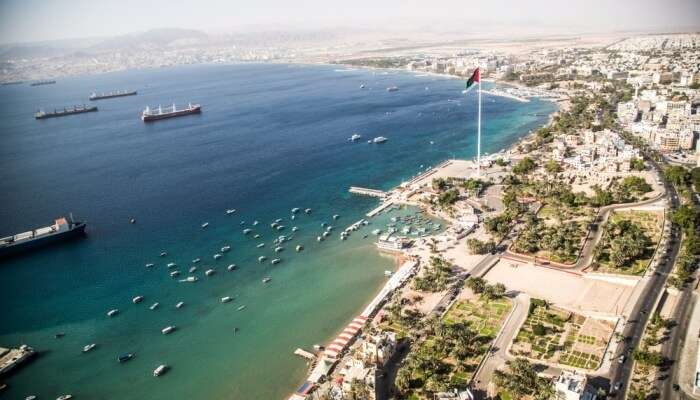
Aqaba: Exploring Jordan's coastal city
Aqaba, a coastal city in Jordan, offers a unique blend of historical sites, vibrant culture, and natural beauty. Situated along the Red Sea, Aqaba is a popular destination for tourists seeking relaxation and adventure.
With its strategic location, Aqaba has been a hub of trade and commerce for centuries, resulting in cultural diversity in its architecture, cuisine, and traditions. Visitors can immerse themselves in the local culture by wandering through the bustling souks, where they can find a variety of traditional crafts, spices, and textiles.
For history enthusiasts, Aqaba Fortress is a must-visit. This ancient fortress dates back to the 14th century and offers stunning views of the city and the Red Sea. The Aqaba Archaeological Museum is another highlight, where visitors can explore artefacts and exhibits that showcase the region's rich history.
Nature lovers will be captivated by Aqaba's underwater beauty. Snorkelling at the Marine Park allows visitors to witness vibrant coral reefs and many marine life. Scuba diving in the Red Sea is a must for a more thrilling adventure. The crystal-clear waters and diverse marine ecosystems make it a paradise for diving enthusiasts.
A stroll along the Aqaba Corniche is recommended to soak in the atmosphere of Aqaba. This waterfront promenade has restaurants, cafes, and shops, offering a perfect opportunity to relax and people-watch.
Whether you're interested in history, culture, or outdoor activities, Aqaba has something to offer. Plan your journey to Aqaba and experience the city's fascinating contrasts.
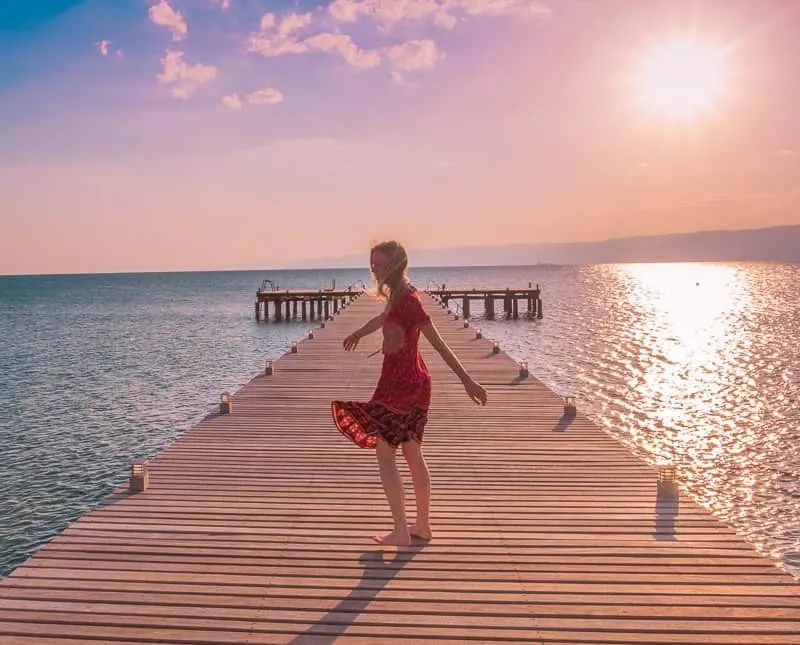
The cultural diversity of Aqaba
Aqaba is a city known for its cultural diversity and rich history. The city has been a melting pot of different civilizations over the centuries, resulting in a unique blend of traditions and customs.
The cultural diversity of Aqaba can be seen in various aspects of the city, including its cuisine, architecture, and festivals. Aqaba is home to a diverse population of Arab Bedouins, Jordanians, and immigrants from neighbouring countries. This diversity is reflected in the local cuisine, which offers a range of delicious dishes influenced by different culinary traditions.
The architectural landscape of Aqaba also showcases its cultural diversity. The city features a mix of traditional Arab architecture, Ottoman-era buildings, and modern structures. Visitors can explore the old town's narrow streets, known as "Al-Hisn," and admire the traditional stone houses adorned with intricate carvings.
Aqaba is also known for its vibrant festivals and celebrations, which bring together people from different cultural backgrounds. The city hosts the Aqaba Cultural Foundation, which organizes various events throughout the year, including music concerts, art exhibitions, and dance performances. These events provide an opportunity for locals and tourists alike to experience the rich cultural heritage of Aqaba.
Visiting Aqaba is not just about exploring its historical sites and natural beauty; it's also about immersing yourself in the city's diverse culture. From tasting local delicacies to participating in cultural events, Aqaba offers a truly immersive experience that celebrates its cultural diversity.

Discovering Aqaba
Exploring Aqaba Fortress: A Glimpse into History
One of the must-visit attractions in Aqaba is the Aqaba Fortress, also known as the Mamluk Castle. This historic site offers visitors a glimpse into the region's rich history and strategic importance. Located right in the city's heart, the fortress stands tall as a testament to the many civilizations that have left their mark on Aqaba over the centuries.
Built during the Mamluk period in the 14th century, the fortress served as a defensive structure against invasions from both land and sea. Its strategic location allowed it to control important trade routes and protect the city from rival empires.
As you enter the fortress, you'll be transported back in time, surrounded by ancient walls and impressive fortifications. Explore the various rooms and chambers, and marvel at the well-preserved architecture. You'll find exhibits displaying artefacts and historical items, providing insight into the history of Aqaba and its significance in the region.
Don't miss the opportunity to climb up to the rooftop, where you can enjoy panoramic views of the city and the Red Sea. The stunning vistas make for great photo opportunities and a chance to appreciate the beauty of Aqaba from above.
Whether you're a history enthusiast or simply curious about the past, visiting Aqaba Fortress is a must. Immerse yourself in the history of this ancient city and gain a deeper appreciation for its cultural significance through this historical landmark.
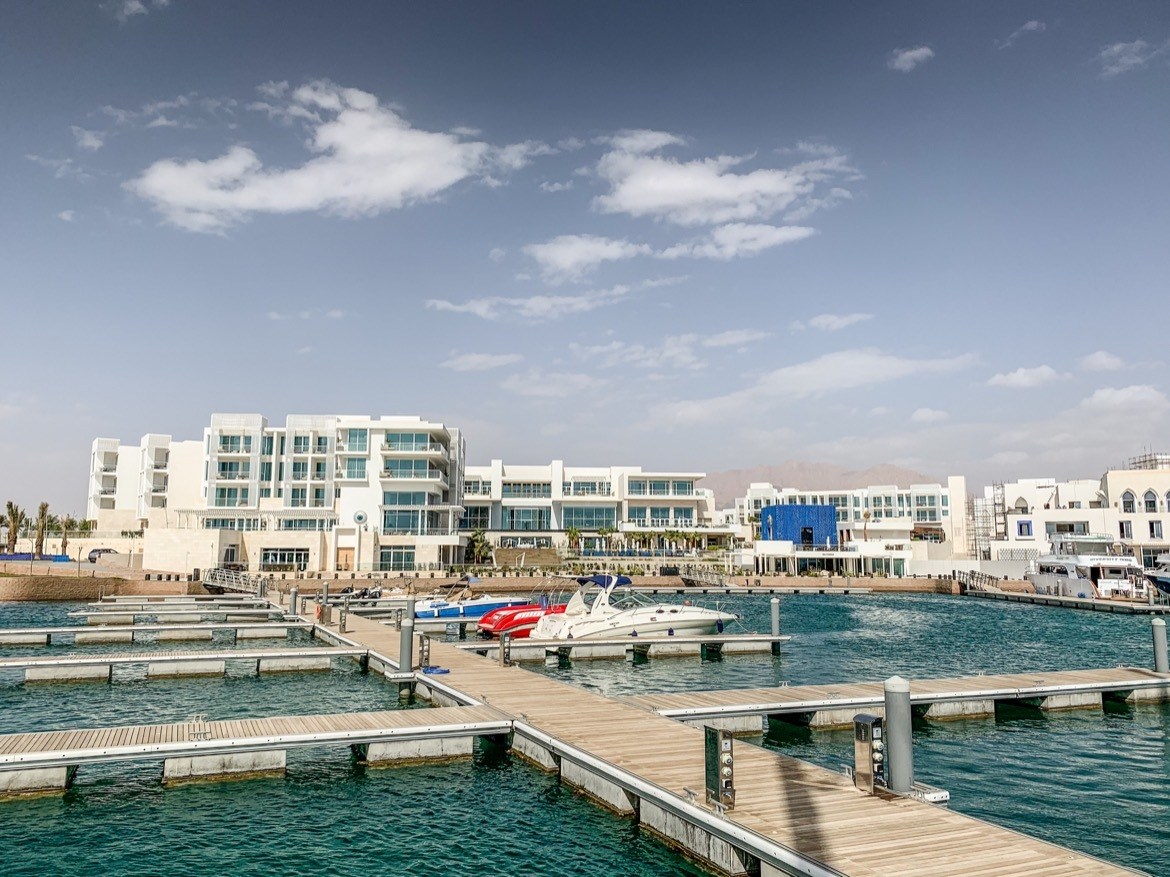
Immersing in the vibrant souks of Aqaba
When visiting Aqaba, one of the must-do activities is immersing yourself in the vibrant souks of the city. These traditional markets offer a sensory overload experience, with colourful displays of spices, fabrics, handicrafts, and local delicacies.
Here are some highlights of exploring the souks in Aqaba:
-
Authentic Shopping Experience: Aqaba's souks glimpse Jordan's rich cultural heritage. Traditional products include Bedouin jewellery, hand-woven textiles, and locally produced spices and herbs. Bargaining is often expected, so be prepared to negotiate for the best deals.
-
Taste of Local Cuisine: The souks are a food lover's paradise. You can sample various traditional Jordanian dishes, such as falafel, mansaf (a savoury lamb dish), and kunafa (a delicious dessert made with shredded pastry and sweet cheese). Don't forget to try the refreshing mint tea or Arabic coffee while you explore the market.
-
Meeting Local Artisans: Aqaba's souks offer a chance to interact with the local artisans who create the unique handicrafts sold in the market. You can watch them skillfully create pottery, carve intricate designs on wood, or weave beautiful tapestries. These artisans are proud of their craft and are often happy to share their stories and techniques with visitors.
-
Exploring the Atmosphere: The souks are bustling with activity, and wandering through the narrow alleyways is an adventure. The vibrant colours, captivating aromas, and sounds of haggling create a lively atmosphere that immerses you in the local culture.
Immerse yourself in the vibrant souks of Aqaba and experience the rich cultural heritage of Jordan up close.

Snorkelling at the Marine Park: Witnessing underwater beauty
Snorkelling at the Marine Park is a must-do activity for nature enthusiasts visiting Aqaba. Located in the northern part of the Red Sea, the Marine Park offers a unique opportunity to witness the breathtaking underwater beauty of the region.
Here are some reasons why snorkelling at the Marine Park is an unforgettable experience:
-
A Diverse Marine Ecosystem: The Marine Park boasts a diverse array of marine life, including colourful corals, tropical fish, and even the occasional turtle or dolphin. Snorkelers can explore the coral reefs and observe the vibrant aquatic life up close.
-
Crystal Clear Waters: The waters of the Red Sea are known for their exceptional clarity, providing excellent visibility for snorkelers. The calm and pristine conditions make it easier to spot marine creatures and appreciate the intricate details of the underwater environment.
-
Accessibility for All: Snorkeling at the Marine Park is suitable for all skill levels, making it an inclusive activity for families, beginners, and experienced snorkelers alike. The shallow reefs and calm waters offer a safe and enjoyable environment for exploration.
-
Guided Tours and Education: For those who want to enhance their snorkelling experience, guided tours are available at the Marine Park. Knowledgeable guides provide insights into the marine ecosystem, highlighting the importance of conservation and the need to protect the reefs.
-
Stunning Coral Formations: The coral reefs at the Marine Park are a sight to behold. Snorkelers can witness the intricate formations of hard and soft corals, showcasing a kaleidoscope of colours and shapes. This immersive experience is truly awe-inspiring.
-
Preservation Efforts: The Marine Park is dedicated to conserving and protecting the marine environment. Visitors can contribute to these efforts by following responsible snorkelling practices and respecting the fragile ecosystem.
Snorkelling at the Marine Park in Aqaba is an adventure that allows visitors to connect with nature and discover the wonders of the underwater world. Whether you are an experienced snorkeler or a first-timer, this activity promises an unforgettable journey through the Red Sea's vibrant and captivating marine life.

Scuba Diving in the Red Sea: A thrilling adventure
Diving enthusiasts and nature lovers flock to Aqaba for its world-renowned scuba diving opportunities in the Red Sea. With its crystal-clear waters, vibrant coral reefs, and diverse marine life, this coastal city offers a unique and thrilling underwater experience. Here are some reasons why scuba diving in the Red Sea is a must-do adventure in Aqaba:
-
Rich marine biodiversity: The Red Sea is home to over 1,200 species of fish and 250 species of coral, making it one of the most biodiverse marine environments in the world. Divers can encounter colourful reef fish, graceful sea turtles, playful dolphins, and even majestic whale sharks.
-
Excellent visibility: The Red Sea boasts exceptional visibility, often exceeding 30 meters (100 feet). This clear water allows divers to fully appreciate the stunning underwater landscapes, intricate coral formations, and vibrant colours of marine life.
-
Warm waters: Aqaba enjoys warm waters year-round, with temperatures ranging from 20 to 30 degrees Celsius (68 to 86 degrees Fahrenheit). These pleasant water temperatures make diving comfortable and enjoyable, even for those unfamiliar with cold-water diving.
-
Dive sites for all skill levels: Whether you're a novice or an experienced diver, Aqaba has dive sites suitable for all skill levels. Beginners can explore shallow reefs with calm currents, while advanced divers can venture deeper to discover underwater canyons, caves, and shipwrecks.
-
Conservation efforts: Aqaba has implemented strict measures to protect its marine ecosystem. Many dive operators and organizations actively participate in coral reef restoration projects, ensuring the long-term sustainability of the Red Sea's natural treasures.
Planning Your Dive:
When planning your scuba diving adventure in Aqaba, it is recommended to book with reputable dive operators who prioritize safety, has experienced instructors, and provide well-maintained diving equipment. Whether you're a seasoned diver or a first-timer, exploring the underwater wonders of the Red Sea is an experience that will leave you in awe of nature's beauty.

Visiting Aqaba Archaeological Museum: Unveiling the past
Visiting the Aqaba Archaeological Museum is essential for history enthusiasts and culture lovers. This museum offers a fascinating glimpse into the region's rich heritage and ancient civilizations that once thrived there.
Here are some highlights of what you can expect to discover:
-
Architectural Marvels: The museum is housed in a beautifully restored 7th-century Islamic fort, which adds to the historical ambience. The architecture is a stunning blend of traditional Islamic design and modern facilities.
-
Artefacts and Exhibits: The museum exhibits a vast collection of artefacts, ranging from prehistoric times to the Islamic period. You can explore ancient pottery, jewellery, coins, statues, and other valuable archaeological finds. Each exhibit comes with detailed explanations that bring the past to life.
-
The Aqaba Shipwreck: One of the museum's highlights is the Aqaba Shipwreck exhibit. This collection showcases a 16th-century merchant ship discovered off Aqaba's coast. You can marvel at the preserved wooden hull, cargo, and personal belongings that tell the story of trade and seafaring in ancient times.
-
Lively Cultural Events: The museum hosts regular cultural events and exhibitions highlighting Jordanian art, music, and folklore. It's a great opportunity to experience the region's living traditions and engage with local artists and performers.
Before visiting the museum, keep in mind the following tips:
-
Opening Hours and Admission: Check the museum's website or contact them to confirm the opening hours and fees. Remember that the museum may have certain days or times when it closed.
-
Photography: Photography is usually allowed in most museum areas, but be considerate of other visitors and the artefacts. Avoid using flash or tripods that may disturb the ambience or cause damage.
-
Guided Tours: Consider joining a guided tour to understand better the exhibits and the historical significance of the artefacts. The knowledgeable guides can provide valuable insights and answer any questions.
Visiting the Aqaba Archaeological Museum is a journey through time that will leave you with a newfound appreciation for the rich history and cultural heritage of Aqaba and Jordan.
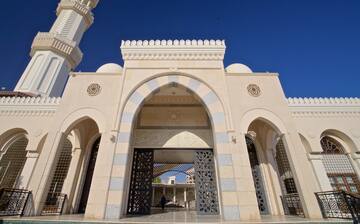
Admiring the Sharif Hussein bin Ali Mosque: A religious experience
Admiring the Sharif Hussein bin Ali Mosque is a religious experience and a chance to appreciate the architectural beauty and historical significance of the mosque. Located in Aqaba, Jordan, the mosque is named after Sharif Hussein bin Ali, the leader of the Arab Revolt against Ottoman rule during World War I.
The mosque stands out with its remarkable features:
- Historical Significance: The mosque symbolises Jordan's history and the legacy of Sharif Hussein bin Ali, who played a crucial role in the country's independence.
- Architectural Beauty: The mosque showcases intricate Islamic architectural elements, including a beautiful dome, minarets, and ornate decorations, reflecting the rich cultural heritage of the region.
- Spiritual Ambiance: As a place of worship, the mosque offers a serene ambience where visitors can experience a moment of tranquillity, observe prayers, and connect with their spiritual side.
- Cultural Understanding: People of various faiths and backgrounds can visit the mosque to gain insights into Islam, fostering cultural understanding and promoting interfaith dialogue.
- Location: Situated in the heart of Aqaba, near the city centre, the mosque is easily accessible and often frequented by tourists exploring the city.
When visiting the Sharif Hussein bin Ali Mosque, it is important to dress modestly out of respect for religious and cultural customs. Additionally, visitors should know prayer times to ensure they do not disturb worshippers.
Note: It is recommended to check the mosque's specific visiting hours before planning a visit to ensure it aligns with its daily activities and prayer schedules.

Strolling along Aqaba Corniche: Soaking in the atmosphere
The Aqaba Corniche, stretching along the coast of the Red Sea, is a vibrant promenade and a must-visit attraction for tourists and locals alike. It offers a stunning view of the sea and is the perfect place to soak in the atmosphere of this bustling city.
Here are some reasons why you should take a stroll along the Aqaba Corniche:
- Scenic Views: The corniche offers breathtaking views of the Red Sea and its crystal-clear waters. Take a leisurely walk or sit on one of the benches and enjoy the calming sound of the waves.
- Street Food: As you walk along the corniche, you'll find a variety of street food stalls offering delicious Jordanian cuisine. Indulge in some falafel, shawarma, or freshly squeezed juices for a quick bite to fuel your exploration.
- Shopping: The corniche has shops offering traditional Jordanian handicrafts, souvenirs, and clothing. Browse through the stalls and find unique items to take home as a reminder of your trip.
- Entertainment: The corniche often bustles with street performers, musicians, and vendors selling traditional trinkets. Enjoy the opportunity to immerse yourself in the local culture and the lively atmosphere.
- Water Activities: If you're feeling adventurous, rent a jet ski or take a boat ride along the coast. The corniche is also a popular spot for snorkelling and diving, with tour operators offering guided trips.
- Relaxation: The corniche is dotted with cafes and restaurants where you can sit back, enjoy a meal, and watch the world go by. Take a break from your exploration and unwind in one of the waterfront establishments.
Whether you're looking for a place to relax, indulge in local cuisine, or enjoy the picturesque views, the Aqaba Corniche offers a delightful experience that should not be missed during your visit to Aqaba.
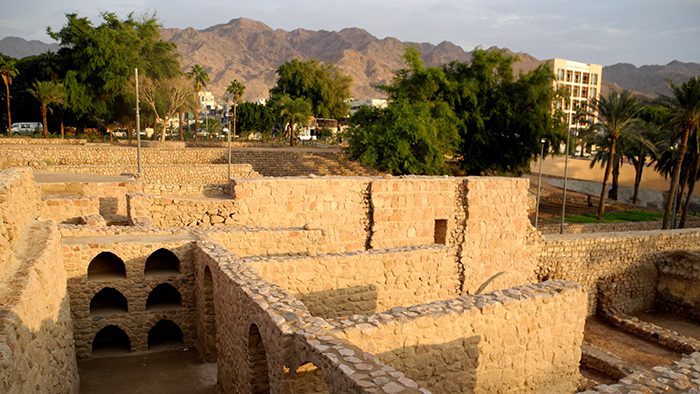
Exploring the Ruins of Ayla: Rediscovering Ancient Islamic History
Ayla, also known as Aqaba's ancient Islamic city, offers visitors a unique opportunity to delve into the region's rich history and cultural heritage. The ruins of Ayla date back to the 7th century and are a prominent testament to the Islamic civilization that once thrived in the area.
Located near the Red Sea shores, Ayla's archaeological site provides a fascinating glimpse into the past. Visitors can wander through the remains of ancient houses, mosques, markets, and public buildings, gaining insights into the daily life and architecture of the Islamic era.
One of the highlights of the Ayla ruins is the Umayyad house, a well-preserved structure that showcases the exceptional craftsmanship of that period. With its intricate geometric designs and plasterwork, the house offers a glimpse into the architectural marvels of the Islamic Golden Age.
Exploring the ruins of Ayla is like taking a step back in time. Visitors can wander through the labyrinthine streets, imagining the bustling trade and vibrant social life that once characterized the city. The archaeological site is well-maintained, with informative signage and guided tours available to provide a deeper understanding of the historical significance of the remains.
A visit to Ayla is a must for history enthusiasts and anyone curious about the Islamic heritage of Jordan. It offers a unique opportunity to reconnect with the region's past and gain a deeper appreciation for the cultural diversity in Aqaba.

Planning your journey to Aqaba: Tips and recommendations
When planning your journey to Aqaba, there are several tips and recommendations to ensure you have a delightful and hassle-free experience:
-
Visa Requirements: Check the visa requirements for visiting Jordan and ensure you have the necessary documents. Most nationalities can obtain a visa on arrival at the airport or border crossing.
-
Weather: Aqaba has a desert climate, with hot summers and mild winters. Visiting during the cooler months of October to April is advisable to avoid extreme temperatures.
-
Pack Essentials: Pack light, breathable clothing, sunscreen, a hat, and comfortable walking shoes. Don't forget your swimwear and snorkelling gear to explore the underwater world.
-
Local Customs: Respect the local customs and traditions. Dress modestly, especially when visiting religious sites, and be mindful of Islamic practices such as prayer times.
-
Language: Arabic is the official language of Jordan, but English is widely spoken, especially in tourist areas. However, it is always appreciated to learn a few basic Arabic phrases.
-
Transportation: Aqaba is well-connected by air, road, and sea. King Hussein International Airport is the main gateway to the city. Taxis and public buses are available for local transportation.
-
Money: The official currency in Jordan is the Jordanian Dinar (JOD). ATMs are widely available in Aqaba, and credit cards are accepted in most establishments.
-
Health and Safety: It's advisable to have travel insurance and check if any vaccinations are required before your trip. Follow basic safety precautions and know your surroundings to ensure a safe journey.
With these tips in mind, you can now plan your journey to Aqaba and immerse yourself in this captivating coastal city's rich cultural heritage and natural beauty.
